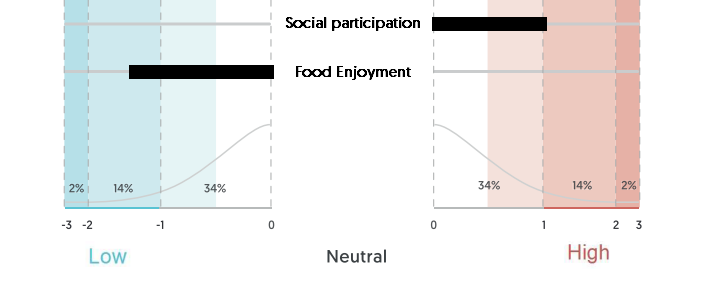Isn‘t everyone a foodie?
By Svenja Klinkenberg, member of the R&D-team of the LUXXprofile
For quite a few people the start of the barbecue season marks a time of good food. But food does not represent a desirable prospect for everyone. The motive FOOD ENJOYMENT reveals why.
The motive FOOD ENJOYMENT describes to what extent food represents a reward for a person or not. People with a high level of motivation get satisfaction from good food. Already thoughts of the next dinner for example trigger a high anticipation. If the food does not meet the hoped-for enjoyment, it results in frustration.
For people with a low expression of the motive FOOD ENJOYMENT on the other hand, food is pure energy intake; they do not get any satisfaction from neither food-intake nor from not-eating. For them, it can even be stressful if they feel they are being forced to eat.
That means, in the motive FOOD ENJOYMENT the meaning of food is depicted as an end in itself. The emotions that trigger food are thus completely independent of other circumstances, such as the environment, the accompaniment, or the exclusivity.
Eating can also be a means to an end, to reward another high or low motive. An example: someone who has a low or neutral expression of the motive FOOD ENJOYMENT and at the same time a high degree of the subject SOCIAL PARTICIPATION, quite likes to cook or eat together, for example meeting for a barbecue. Even if it initially seems as if the person enjoyed eating, the enjoyment of food actually takes a backseat. The togetherness with others in the foreground in this case. The motives SENSUALITY or CURIOSITY, for example, can trigger the eating behavior, as well. So, it pays to look closely: Does a person like to eat because they enjoy good food or because they want to live out a need for socializing, sensuality or maybe curiosity?
In professional life dealing with the motive FOOD ENJOYMENT is also of relevance. So, for a coworker or customer with a low expression of FOOD ENJOYMENT a dinner might not be a suitable incentive. But even here, in combination with a highly pronounced STATUS motif, the exclusive setting can be significant. In a high SOCIAL CONTACT motive sociability can be in the foreground. Or in the case of a high CURIOSITY motive, the exoticism of the food can be rewarding.

Excerpt from a sample profile, with the combination of a low expression of FOOD ENJOYMENT and a high expression of SOCIAL PARTICIPATION.